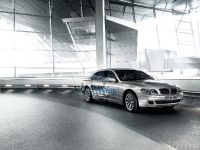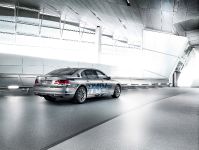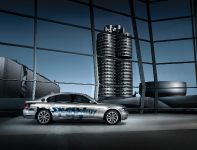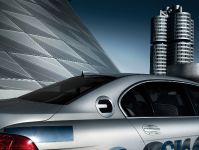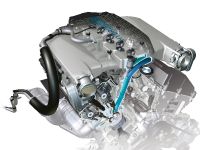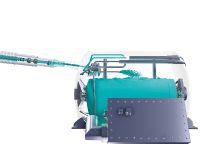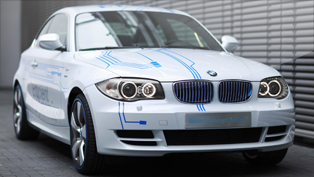BMW Hydrogen 7 cars provide shuttle service for the COP 14 climate change conference in Poznan
Using hydrogen as a fuel, mobility generating practically no CO2 emissions is now very much a reality - and one that delegates at the UN climate change conference COP 14 taking place in Poznan, Poland can experience for themselves. A total of 21 BMW Hydrogen 7 hydrogen-powered cars are providing the official shuttle service at the most important climate change conference of the year. Added to which, the BMW Group is also presenting a pair of electrically-driven MINI E cars at the event.
Practically no CO¬2 emissions: BMW Hydrogen 7 and MINI E The BMW Group is using these two innovative models to showcase the possible shape of sustainable mobility in the future. A pilot project involving well over 500 electrically-powered MINI-based cars has been launched to explore the potential of electromobility in both the USA and Europe. The primary aim of the trial is to analyse how electrically-powered vehicles are driven in everyday conditions. To this end, the BMW Group is placing the MINI E with representative users. The idea is that the data generated will help the company to channel relevant information from practical experience into the ongoing series development of an electric car.
Added to which, the study will also look into the technical and economic challenges presented by the technology, in particular those relating to the lithium-ion battery. The MINI E may develop nothing in the way of local CO2 emissions, but it delivers driving pleasure aplenty. Acceleration from 0-100 km/h in 8.5 seconds and a limited top speed of 152 km/h equip it perfectly for everyday use, as does a maximum range of 250 kilometres. The BMW Group has made two examples of the MINI E available for test drives in Poznan by way of demonstrating this technology.
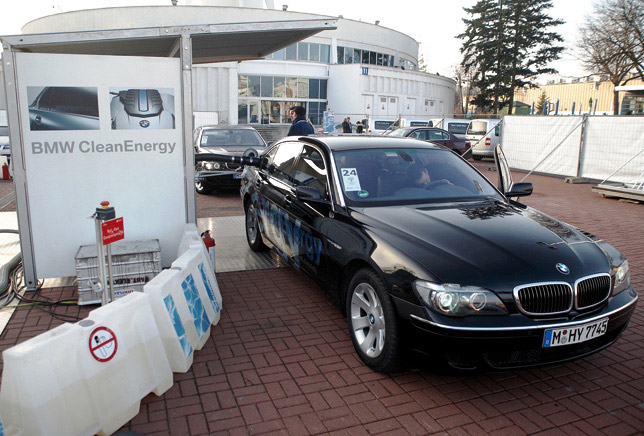 The BMW Hydrogen 7 has already furnished evidence of its everyday practicality in countries around the world. Indeed, 100 examples of the car have together racked up more than 3.5 million kilometres worldwide since the launch of the hydrogen fleet in late 2006. The BMW Hydrogen 7 is fitted with a hydrogen combustion engine, which can be fuelled with either petrol or the cleanest option of all: hydrogen. In hydrogen mode the BMW Hydrogen 7 also emits virtually no CO2 (below 5grams/100 kilometres), yet delivers 260 hp - and thus proofs that sustainable mobility and "Sheer Driving Pleasure" can go hand in hand. All of which means that the delegates in Poznan are enjoying familiar reliability and comfort in the fleet of 21 BMW Hydrogen 7 official shuttle vehicles at the summit, but with an extra dose of environment-friendliness.
The BMW Hydrogen 7 has already furnished evidence of its everyday practicality in countries around the world. Indeed, 100 examples of the car have together racked up more than 3.5 million kilometres worldwide since the launch of the hydrogen fleet in late 2006. The BMW Hydrogen 7 is fitted with a hydrogen combustion engine, which can be fuelled with either petrol or the cleanest option of all: hydrogen. In hydrogen mode the BMW Hydrogen 7 also emits virtually no CO2 (below 5grams/100 kilometres), yet delivers 260 hp - and thus proofs that sustainable mobility and "Sheer Driving Pleasure" can go hand in hand. All of which means that the delegates in Poznan are enjoying familiar reliability and comfort in the fleet of 21 BMW Hydrogen 7 official shuttle vehicles at the summit, but with an extra dose of environment-friendliness.
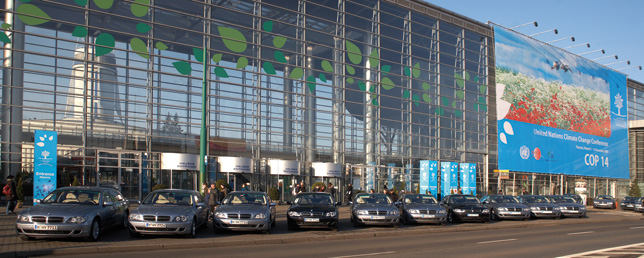 Focusing on developments further up the supply chain
The use of hydrogen and electrical power ensures that the cars themselves emit practically no CO¬2. The BMW Group is a leader in the development of these two technologies. Indeed, experts in Munich first began researching and building battery and hydrogen-powered cars back in the 1970s. The BMW Hydrogen 7 shuttles in Poznan run on climate neutral hydrogen. If hydrogen is produced out of renewable energy through electrolysis, CO¬2 emissions can be cut by up to 90% further up the supply chain. The key for both hydrogen power and electromobility lies not only in the ability of the vehicles to run CO2-free but also in the development of supply chains and infrastructure to provide them with clean hydrogen and electricity. This represents both a political and an economic challenge. The BMW Group is seeking discussions on open questions related to hydrogen and electromobility at both the climate summit in Poznan and in regular stakeholder dialogue.
Focusing on developments further up the supply chain
The use of hydrogen and electrical power ensures that the cars themselves emit practically no CO¬2. The BMW Group is a leader in the development of these two technologies. Indeed, experts in Munich first began researching and building battery and hydrogen-powered cars back in the 1970s. The BMW Hydrogen 7 shuttles in Poznan run on climate neutral hydrogen. If hydrogen is produced out of renewable energy through electrolysis, CO¬2 emissions can be cut by up to 90% further up the supply chain. The key for both hydrogen power and electromobility lies not only in the ability of the vehicles to run CO2-free but also in the development of supply chains and infrastructure to provide them with clean hydrogen and electricity. This represents both a political and an economic challenge. The BMW Group is seeking discussions on open questions related to hydrogen and electromobility at both the climate summit in Poznan and in regular stakeholder dialogue.
